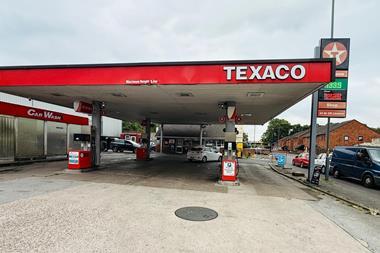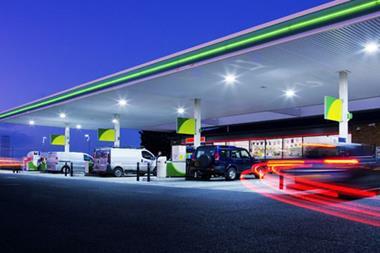With fuel margins so low, it’s easy to understand why many retailers would want to keep investment in the forecourt side of their business low as well. But failing to properly monitor fuel stocks and ensure pumps are dispensing accurately could be nothing short of a false economy.
Over-dispensing pumps are the cause of almost a third of wet-stock loss but retailers are still not checking their dispenser meters regularly enough, according to Phil Prow, sales and marketing director of Vianet Fuel Solutions (VFS).
"Over-dispensing pumps can have a serious effect on profit," says Prow. "Just two nozzles selling 3,000 litres a week each over-dispensing by as little as 0.25% can cost £800 in lost profits over the course of a year. With profit margins below 2%, no one can afford this. Almost a third of all fuel-stock losses are down to inaccurate pump meters, which equates to an average stock loss of £300 per month, per site."
To tackle the problem Prow urges retailers to have their pumps checked regularly, and not to wait for local Weights and Measures (W&M) departments to point this out. "People often think because the W&M report is okay that they don’t have a problem, but W&M is only really interested in pumps that are significantly under-dispensing," says Prow. "They are under no obligation to tell you if they are over-dispensing; particularly if that is by only a small amount. However, what is a small amount to them may add up to a significant hit on profits.
"The rough rule of thumb is that every site should have their meters checked once a year. It only costs a few hundred pounds and they would see an instant return. Many go two-to-three years without any check. Sites with a larger throughput would see considerable benefit in doing it twice a year."
There are a number of companies that can perform pump-meter checks for a lot less than the potential profit loss. VFS, for example, can carry out a full site meter accuracy test and calibration, including adjustment and re-stamping, at an all-in fee starting at £350 per site.
Pump meter calibration checks are one of Fairbanks’ key onsite services, and Gareth Jenkins, business account manager at the firm, says: "It is our annual pump measure checks that can often offer the quickest payback to our customers. We recommend that each site has an annual site audit.
"An independent retailer, who signed a three-year contract with Fairbanks which included our real-time wet-stock monitoring as well as an annual site audit, saved between £1,000 and £3,000 a year from over-dispensing pumps that were reset back to strike during the annual site visit."
Traditionally, pump-meter checking has been done by filling an approved test measure can with fuel and comparing the level on the can with the pump volume readout, but Eurotank Environmental has introduced TrueZero, a new method of calibrating pump meters. TrueZero is said to eliminate the three main areas where errors or variances can affect the meter checking process vapourisation when checking petroleum pumps, thermal expansion and contraction of the metallic can, and human error.
Edward Wheeler, managing director of Eurotank, says: "As the can is filled, an average of 0.1% volume is lost through vapourisation of the petroleum spirit. The vapour is either lost out of the top of the can if there is no active Stage 2 vapour recovery (VR), or if Stage 2 VR is active, it will be recovered back to the underground storage system.
"The second error is caused by thermal expansion and contraction of the metallic can, which will change its volume by 1ml for every one degree celsius of temperature change. Most cans are calibrated by Trading Standards at room temperature yet they are used outside so will change volume constantly, depending on the ambient temperatures on the day of calibration. Thirdly, mistakes in reading the volume dispensed, variations in the filling speeds, and nozzle placement position inside the measure can affect the result."
Eurotank’s new TrueZero pump prover removes the nozzle from the process because the hose connects directly into the TrueZero unit, making it a fully closed system that eliminates the vapourisation loss. The thermal expansion properties of the piston prover casing are said to be negligible in comparison to a can so the ambient temperature has no quantifiable effect on the reading. Human error is also eliminated because TrueZero dictates when the pump stops rather than the squeezing of the trigger.
"TrueZero is not black magic the benefits are real and based on physics and comprehensive studies," says Wheeler. "In the country where TrueZero was developed, the use of cans has been banned due to the inherent variances discovered when comparing measurements with these new types of calibration technologies.
"The average savings we have seen, on brand new equipment as well as recently calibrated pumps, has been approximately 0.15%. To put this into the context of fuel margin profitability, that is around 9% of a litre on a 60-litre car tankful. Around 13p per customer is therefore gained when using TrueZero as the calibration technology. This is the saving against the measure being perfectly ’on strike’ with a can. As the price of fuel increases, this pence per tankful will increase proportionally.’’
Wet-stock monitoring
The level of wet-stock monitoring cover independent retailers adopt can vary from forecourt to forecourt, says Fairbanks’ managing director, Bob Conlin. "We feel sites that monitor their wet stock in real-time, benefit from the optimum cover because any issues on site can be pinpointed as soon as they occur," he advises.
The next level of cover is Statistical Inventory Reconciliation (SIR), which Fairbanks pioneered in the UK back in 1996. This uses daily data and is said to be a very effective method of monitoring, but issues on site can take a lot longer to spot and resolve due to the smaller volume of data received less frequently.
"After 18 years of growing Fairbanks and raising standards of wet-stock control, the feedback about SIR analysis and real-time data is that it is still something of an enigma," says Conlin. "We want to remove the mystery surrounding SIR and allow retailers to have visibility of their wet stock and improve the efficiency of their business.
"There are the rare few independent retailers who do not use any method to monitor their wet stock, and see wet-stock management as a bit of a mystery," he adds. "It is these forecourt owners that we seek to inform about the benefits good third-party wet-stock management can have on their business."
Wet-stock management is Fairbanks’ core service and consequently its most popular. It enables forecourt owners to gain complete visibility of their data while giving them peace of mind that a second pair of eyes is looking after their business, ensuring it is run as efficiently and cost effectively as possible.
Says Gareth Jenkins: "By choosing Fairbanks to manage their wet stock, customers are demonstrating due diligence, ensuring their forecourt is compliant with industry regulations and also ensuring they are protecting the future resale value of their business. Our wet-stock management gives forecourt owners more time to concentrate on running their businesses."
Fairbanks offers several bespoke wet-stock management packages, depending on the equipment on site and the amount of cover and involvement the customer wants. The simplest level of cover is SIR monitoring, which is compliant with all equipment on site including manual dip sticks, and is available from under £3 a day. A step up from this is real-time monitoring, where the company’s real-time data service iBank can pinpoint the source of loss; process all automatic tank gauge alarms in real time; detect any water ingress into the tank; track every litre of fuel from the delivery terminal to the customer’s vehicle; recognise dispenser meter drift and changes in flow rate; detect theft in real time and alert a contact; reduce the amount of site interventions required to fix an issue; and access their wet-stock data and management reports via a secure website.
Fairbanks is also now able to poll wet-stock data directly from the forecourt thanks to new software in the Tokheim Fuel POS system. Retailers who have the latest version (v32 and above) can take advantage of Fairbanks’ services quicker than ever before, eliminating the need for an additional engineering visit to install extra cabling, and the data is automatically forwarded to Fairbanks’ headquarters in Lancashire.
Michelle King, business development director at Tokheim, says: "By offering alternative data capture options, using either the Fairbanks iBank or Tokheim Fuel POS, to fuel management solutions such as ATC (Automatic Temperature Compensation), which is fully approved by weights and measures and NMO, we can ensure you dispense your fuel at the same volume regardless of the temperature. The link between Fairbanks and Tokheim allows us to offer customers an all-round wet-stock solution using intelligent equipment, data management and reporting.’’
Fairbanks and Tokheim are not the only two companies to have formed a partnership in wet-stock management. BigOil has partnered with Vianet to launch a new service that provides retailers with instant visibility on their sales, fuel costs and margins in real time.
It offers all the standard services that BigOil subscribers would expect but is now enhanced with Vianet’s loss analysis service and the creation of a new Margin Management toolbox.
Vianet’s Phil Prow says: "We have worked with BigOil to develop a state-of-the-art and intuitive web portal that makes it very easy for the retailer to see information on sales and margin performance instantly. It includes really useful features such as automatic delivery costing and fuel temperature analysis. The result is a game-changing product that allows the independent retailer, whether a single site or a large group, to truly maximise profitability.
"There are still thousands of retailers who do nothing more than reconcile their stock on an occasional basis. As a minimum they should reconcile it daily. Even if they do that, many do little or no analysis to discover why they are losing stock. There is a certain amount of apathy as they believe that there is little they can do about it. That’s not true wet-stock loss can be reduced."
The new service has been trialled by Petrol Retailers’ Association members and designed specifically for the independent retailer. The service also offers the latest loss analysis service, which monitors fuel every few seconds to provide instant information on the causes of loss such as fuel giveaway at the dispenser, 24/7 theft monitoring and leak detection.
Automatic tank gauging
Automatic tank gauging can enable retailers to improve the daily efficiency and profitability of their sites, according to Aditya Varadpande, marketing director for wet-stock management at Gilbarco Veeder-Root. "By installing an automatic gauge, retailers can account for their wet stock by understanding variances, recognising meter drift, identifying leaks and becoming aware of losses through delivery or theft," says Varadpande. "By understanding and mitigating any issues, retailers can ensure a positive impact on their bottom line."
The gauges from the TLS-2 range eliminate the need to manually dip tanks, which in turn removes uncertainties over stock readings, frees up time, and mitigates health and safety risks. In addition, retailers are able to identify and address causes of variance before they become critical issues.
Another popular product is the TLS-350R which, in addition to the functionality offered by the TLS-2 series, provides automatic calibration, sudden loss/theft detection, and advanced leak detection functionality for tanks and lines for all forecourts, including those that operate 24 hours a day. Features like hourly reconciliation monitoring (HRM) ensure any fuel losses are immediately identified so corrective action can be taken quickly.
Gilbarco Veeder-Root’s wet-stock management solutions also include preventative maintenance, off-site calibration of tanks, variance reduction, meter drift, theft and leak detection.
In the UK, Gilbarco Veeder-Root also has in place a Fuel Management Service. This team provides a customised and diagnostic monitoring service to the retailer enabling more efficient fuel operations by improving fuel management and inventory control. With the ability to resolve automatic tank gauge alarms remotely, the team can improve site up time and lower servicing costs.
"By proactively managing their wet stock, fuel retailers can better understand the variances on their site and improve their profitability, environmental compliance and performance of their forecourts by increasing up time," says Varapande. "Despite these benefits, many are failing to do enough. Increasingly, examples are being seen across the UK of retailers investing their resource and budget in the management and monitoring of their dry stock, with little investment in wet-stock control.
"Real time wet-stock monitoring enables quick detection of potential issues and the identification of sudden loss such as through theft. By being able to access wet-stock data both on site and remotely, retailers can make real-time business decisions."


























No comments yet